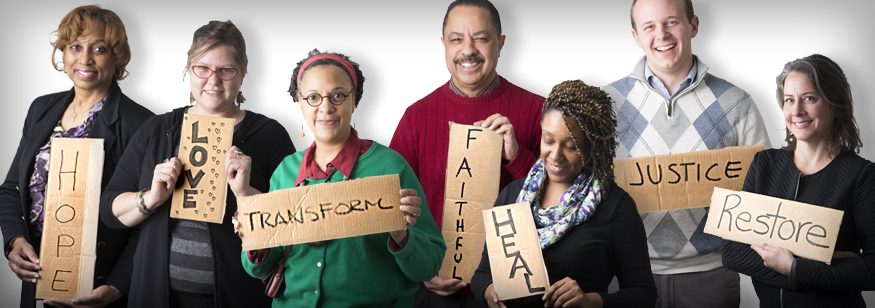Editor’s note: Bread Blog is running a year-long series exploring passages from The Poverty & Justice Bible published by the American Bible Society (Contemporary English Version). The intent is a theological exploration at the intersection of social justice and religion. The blog posts will be written by members of the church relations staff at Bread for the World.
By Krisanne Vaillancourt Murphy
“The Lord’s Spirit has come to me, because he has chosen me to tell the good news to the poor. The Lord has sent me to announce freedom for prisoners, to give sight to the blind, to free everyone who suffers, and to say, ‘This is the year the Lord has chosen.’” (Luke 4:18-19)
God is a God of history, constantly transforming our broken world. When we tune in through prayer and scripture reflection, we can see evidence of God’s hand shaping our world and surprising us even in the midst of our uncertainty.
What’s broken in our world? How about the 1.2 billion people who still live in extreme poverty — on less than $1.25 per day — and the 2.6 million children who die of hunger-related causes each year?
Where is evidence of God’s transformative work? The number of hungry people has dropped significantly over the past two decades. And since 1990, there has been a 34 percent reduction in global hunger.
He is Risen indeed!
We are called to submit to God’s plan to end hunger for all creation.
In Luke 4 as found in Isiah 61, scripture shows us a God who hears the cry of enslaved people and delivers them, releasing captives and setting oppressed people free. Surely God lives! Thousands of years ago, God used Moses to appeal to the Egyptian government to release the enslaved Hebrew people. This began the long journey of the Israelites’ great exodus from Egypt. “Moses said to the people, ‘Do not be afraid, stand firm, and see the deliverance that the Lord will accomplish for you today ….’” (Exodus 14:13)
As followers of Christ, we see signposts of God’s saving power and path to freedom in yesterday and today. But seeing isn’t our only task. We aren’t called to be bystanders or onlookers of God’s transformative work. As Pope Francis said recently, “I see the Church as a field hospital after a battle.”
As members of the body of Christ, we are a transformed people empowered to partner in God’s work. And as citizens of the United States and stewards of God’s creation, we have a unique calling. For Christian advocates, that often means addressing root causes that keep people impoverished, hungry, and suffering. In order to change this, we need to engage governments and policies for the common good, for the flourishing of society.
God also uses enlightened rulers as agents of deliverance. In Psalm 72, King David offers prayerful instruction for his son Solomon, who will become the ruler of a nation. David’s expression of devotion and care for his people, near and far, is a foreshadowing of the righteous reign of Christ and his promise and covenant. “For he delivers the needy when they call, the poor and those who have no helper. … From oppression and violence he redeems their life .…” The good and faithful governor Nehemiah rebuilds a community, giving life and restoring dignity to the people, with the support of the God-inspired benevolence of King Cyrus of Persia. (Nehemiah 5:1-6)
God is raising up modern-day Nehemiahs and calling us to get about the business of new creation.
Are you ready?
Krisanne Vaillancourt Murphy leads national evangelical church relations at Bread for the World.



